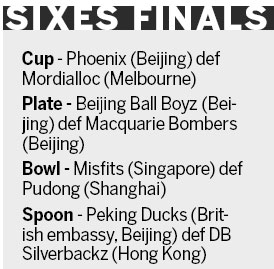|
The Shell Shenyang Sunbirds' Yang Yusong (left) and Sun Lei return to the team's tent after batting in the Beijing Cricket Sixes tournament at Dulwich College last weekend. [Provided to China Daily] |
The appearances of an all-China team at this year's Beijing Cricket Sixes may just provide the boost the game needs here, Tym Glaser reports.
Beijing's Cricket Club's Phoenix team convincingly won the Beijing Cricket Sixes' Chander Oberoi Cup on Sunday to complete a hat-trick of victories at the Dulwich College ground. However, the real winners of the event may have been a hardy and enthusiastic bunch of Chinese players from Shenyang, Liaoning province, who got a taste of truly competitive cricket and the social atmosphere that surrounds the game. The Shell Shenyang Sunbirds won only one of their four games at the event, but the team members gained a wealth of experience and memories that they can pass on to fellow students at the Shenyang Aerospace University and Shenyang Sports University and, just maybe, that could provide the kernel to grow the game beyond the expatriate community in China.
Matthew Smith, a 41-year-old English teacher at the loftily named Aerospace University who has nurtured cricket in the northeastern province since his arrival in China in 2003, believes his side's first appearance at the Beijing event is a small but significant step in promoting the foreign game in this country.
"It's definitely a positive move, but there is still a long way to go," said Smith after his team's last game on a balmy Sunday.
"Nobody knows what cricket is in the general population. More people have heard of baseball than cricket. But there are little breakthroughs; people now say, 'what sort of racket is that?' and another will say, 'It's a cricket bat' when I am walking home from training," he said.
Beijing and Shanghai boast strong leagues, but are expat dominated. Shenyang, while not having a league of its own, is the kingpin of China's national cricket scene with the Sports University dominating the national championship over the past few years and Aerospace flying a close second.
"We probably get 50 or 60 to initially come out to play per year, but half of them will go within a week or so, so we are down to 20 or 30 to work with for the season," Smith said of the recruiting of players each year.
"At the beginning, we had to almost force people to come out to play, but they now come willingly. They are improving all the time and learning a lot. This current batch of players have good technique, but have to learn a lot about the rhythm of the game."
One of many problems for the slowly growing sport is a lack of places for players to compete after leaving university.
"The Chinese cricket body tries to get national players into jobs or work experience," Smith said. "But, essentially, most guys will play at university for three or four years then go off to work in a bank or a shop as there is no club or social cricket. I try to get people to come back and join in (at the Aerospace University) but it's incredibly difficult."
Some sort of synergy between the Chinese authorities and the major expat leagues could go a long way to solving that problem, but the two continue to run along parallel lines.
"The relationship between the BCC and the Chinese authorities is not easy. They never are. It's key that both sides get together. We need Chinese to play against and with the foreigners here on the pitch to get that experience it's invaluable and you can't get it anywhere else."
That was apparent watching the Chinese over the weekend.

"They've loved it," Smith said of his team's three-day experience among all the food, beer, wine and Australian and English accents. "I think they were a bit shell-shocked in the beginning, they didn't know what to expect. Then they saw people laughing and joking and some good cricket and some bad cricket - and everything in between - and it was a very difficult and confusing environment to play in for them, but also a great fun one.
"I wanted my lads to come to party as well as play but there's also knowledge and skills that they can learn while enjoying the atmosphere."
Yang Yang, the team's 22-year-old wicketkeeper/batsman, and teammate Yang "Ricky" Yusong, also 22, heartily agreed.
"It's very funny," Yang Yang said. "I enjoy watching the people and the games. I watch the games and try to learn from the other batsmen; learn how to keep the ball down. And also watch all the keepers and see what they do to improve how I play. When I finish school (in two years) I will still want to play and maybe go back to the university to help the new players "
Yang No 2, a steady medium-pace bowler, said, "I've made a lot of new friends."
As for the competition, "it's a little bit tougher than I thought, but it is more fun and I have learned a lot.
"I will tell my friends when I get back that they must train hard to get better so they can come to events like this."
The first appearance of an all-Chinese team at the Beijing Sixes will not be the last, according to Smith.
"We will definitely be back ... I want to bring two teams next year," he said.